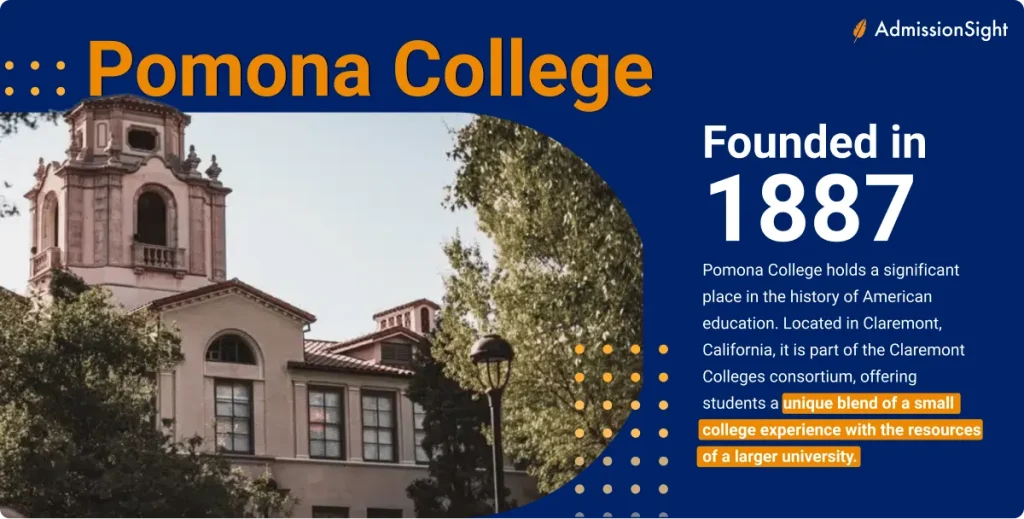Thinking about how to get into Pomona College? Ranked #5 among the best liberal arts colleges in the country, Pomona is known for its rigorous academics, tight-knit community, and commitment to intellectual exploration. It’s no surprise that it attracts ambitious and passionate students from all over the world.
But let’s be real: getting in is no walk in the park. With an acceptance rate of 7.1%, Pomona’s admissions process is highly competitive, and just strong grades and test scores won’t cut it. They want students who are deeply curious, passionate about their interests, and ready to contribute to a vibrant, diverse campus.
If that sounds like you, don’t stress. We’ve got you covered! In this guide, we will break down everything you need to know about how to get into Pomona College, from GPA expectations to essay tips, to help you put together a standout application. Let’s jump straight in.
- How Hard Is It to Get into Pomona College?
- Pomona College Admission Requirements
- Pomona College GPA Requirements
- Pomona SAT Scores
- Pomona ACT Scores
- How to Increase Your Chances of Getting into Pomona
- Pomona College Application Deadlines
- Frequently Asked Questions
- Takeaways
How Hard Is It to Get into Pomona College?
For the Class of 2028, Pomona College reviewed 12,249 applications and offered admission to only 868 applicants. With an acceptance rate of 7.1%, it’s clear that Pomona ranks among the most competitive schools in the nation. You can check out the Pomona College Class Profile for more insights into past admission trends
Curious about how Pomona’s acceptance rates have changed over the years? Here’s a quick overview:
|
Pomona Class |
Acceptance Rate |
| Class of 2024 |
8.6% |
| 6.6% | |
| Class of 2026 |
7% |
|
Class of 2027 |
6.8% |
| Class of 2028 |
7.1% |
While Pomona’s acceptance rate has fluctuated slightly, it remains highly competitive. Do not let that discourage you. Learning how to get into Pomona College means understanding that admissions are not just about numbers. A strong application that highlights your passions, achievements, and unique perspective can make all the difference.
Pomona College Admission Requirements
Applying to Pomona College is about more than just having good grades. Pomona looks for students who are curious, engaged, and ready to bring something special to campus. Here is what you need to know about their application process:
- High school transcript. Pomona wants to see that you’ve challenged yourself academically with courses like AP, IB, or honors classes. Your transcript should reflect consistent effort, strong performance, and a love for learning.
- Recommendation letters. You will need two letters from teachers in academic subjects and one from your school counselor. Choose teachers who really know you, not just your grades but how you engage in class, collaborate with others, and tackle challenges.
- Essays. This is your chance to stand out. Pomona wants to hear your story in your own voice. They require an academic interest statement, a short-response essay, and a longer-response essay.
- Standardized test scores (optional). Pomona is test-optional, so you don’t have to submit SAT or ACT scores. If you think your scores will help, feel free to include them, but if not, no worries. Pomona evaluates applications holistically.
- Mid-year and final transcripts. Your senior year still matters. Your school counselor will submit a mid-year report with your first-semester grades, and Pomona will check your final transcript to make sure you stayed on track.
You can apply through the Common Application, Apply Coalition on Scoir, or QuestBridge. Pomona does not have a preference, so pick the one that works best for you.
Pomona College takes a holistic approach, meaning they consider a range of factors that paint a full picture of who you are as a student and person. Understanding how to get into Pomona College starts with knowing that every part of your application counts.
Academically, Pomona values rigor, so they will look closely at the difficulty of your high school courses, your GPA, and your application essays.
Outside of academics, Pomona puts a lot of weight on extracurricular activities, personal qualities, and talents. They want students who are engaged, passionate, and bring something unique to campus.
Volunteer work, work experience, and being a first-generation college student is also something they take into account.
On the other hand, factors like state residency, alumni relation, demonstrated interest, and religious affiliation do not affect admissions decisions, so there is no need to stress about those.
At the end of the day, Pomona is looking for students who will contribute to the campus community in meaningful ways. Whether you stand out because of your leadership, creativity, resilience, or dedication to a cause, make sure your application highlights what makes you, you.
We’ll go over all these factors in detail in the sections below.
High school coursework recommendations
Your transcript is one of the first things Pomona looks at, so having a strong academic foundation is important. To stay competitive, here is what Pomona recommends:
- 4 units of English
- 3 to 4 units of Mathematics
- 2 to 4 units of Science(including at least 2 lab sciences)
- 3 units of Foreign Language
- 2 to 3 units of Social Studies
That adds up to at least 14 to 18 core academic units, depending on your coursework. While these are recommendations rather than strict requirements, following them will put you in a strong position for Pomona’s admissions process.
To stand out even more, take the most challenging courses available to you—whether that means AP, IB, or honors classes. Pomona values students who push themselves academically, so a rigorous high school curriculum can strengthen your application.
Pomona College GPA Requirements
Pomona does not have a strict minimum GPA requirement, but with its highly selective admissions process, strong academics are essential for a competitive application. If you’re aiming to learn how to get into Pomona College, maintaining a high GPA is a critical part of the process.
Pomona College average GPA
While Pomona does not officially release GPA data, aiming for a 4.06 GPA or higher gives you the best shot at getting in. Since Pomona prioritizes academic rigor, most admitted students have taken challenging coursework, including AP, IB, or honors classes.
Although official GPA distribution data is not available, a strong academic record is crucial. Pomona’s Common Data Set for 2024-2025 shows how top-tier their admitted students are:
- 90% of students ranked in the top 10% of their high school class
- 99% ranked in the top 25%
- 100% ranked in the top 50%
- 0% ranked in the bottom half
This makes it clear that Pomona looks for students who excel academically. However, grades are just one part of the story. Pomona takes a holistic approach to admissions, so they also consider extracurriculars, essays, recommendation letters, and personal qualities.
If your GPA is not perfect, do not stress. A strong application with meaningful activities, leadership experience, and compelling essays can still help you stand out.
To stay competitive, aim for a 4.06+ GPA while taking the most rigorous courses available at your school. More than just numbers, Pomona looks for students who are intellectually curious, ambitious, and ready to make an impact.
Pomona SAT Scores
Pomona is test-optional, meaning you do not have to submit SAT scores if you do not want to. However, if you choose to send them, they should be strong to stay competitive. If you’re thinking about how to get into Pomona College, submitting high scores can underscore your academic readiness and give your application an extra boost.
Pomona average SAT
According to Pomona’s latest Common Data Set, here are the typical SAT scores for admitted students:
|
25th Percentile SAT Composite Score |
50th Percentile SAT Composite Score | 75th Percentile SAT Composite Score |
| 1500 | 1530 |
1550 |
Here’s a breakdown of section scores:
|
Section |
25th Percentile Score | 50th Percentile SAT Composite Score | 75th Percentile SAT Composite Score |
| SAT Evidence-Based Reading and Writing (EBRW) | 740 | 760 |
770 |
|
SAT Math |
750 | 780 |
790 |
Most admitted students scored very high on the SAT. In fact, 98.1% of Pomona students had composite scores between 1400 and 1600, while only 1.9% scored between 1200 and 1399.
In the Math section, 95.5% of students scored between 700 and 800, while in the EBRW section, 97.4% reached that range.
To stay competitive, aim for a 1550 or higher, with strong scores in both Math and EBRW. A score in this range shows that you are well-prepared for Pomona’s rigorous academics.
That said, do not panic if your scores are not perfect. Pomona evaluates applications holistically, so your coursework, extracurriculars, essays, and recommendations all matter. If your SAT scores are close but not quite there, consider retaking the test to boost your chances.
Does Pomona College require the SAT?
Not at all! Pomona is test-optional, which means you get to decide whether or not to submit your SAT scores. If you have a strong score, sending it can reinforce your academic profile and give your application an extra boost. But if your scores are not where you want them to be, leaving them out will not put you at a disadvantage.
Pomona’s admissions process is holistic. They put a lot of emphasis on your coursework, extracurriculars, essays, and recommendations. Rather than focusing on numbers alone, Pomona wants to see who you are as a student and how you will contribute to their campus.
Pomona ACT Scores
Pomona does not have a strict ACT cutoff, but if you choose to submit scores, they should be strong. Knowing how to get into Pomona College means recognizing that while the ACT is optional, a solid score can still demonstrate your readiness for its challenging academics.
Pomona average ACT
Here is a look at the ACT scores for admitted Pomona students:
|
25th Percentile ACT Composite Score |
50th Percentile ACT Composite Score | 75th Percentile ACT Composite Score |
| 33 | 34 |
35 |
As for the subject breakdown:
|
Section |
25th Percentile Score | 50th Percentile Score | 75th Percentile Score |
| ACT English | 35 | 35 |
36 |
|
ACT Math |
31 | 33 | 35 |
| ACT Reading | 35 | 36 |
35 |
|
ACT Science |
32 | 34 |
35 |
Most admitted students scored very well on the ACT. In fact, 96.6% of students had a composite score between 30 and 36, and nearly all students scored 30+ in English, Reading, and Science. For Math, about 81.4% scored at least 30.
If you want to be in the most competitive range, aim for a 35 or higher. But if your scores are not quite there, don’t panic. Pomona takes a holistic approach to admissions, so factors like your coursework, extracurriculars, essays, and recommendations all play a big role. If standardized testing is not your strong suit, you can absolutely stand out in other areas.
Does Pomona prefer the ACT or SAT?
Neither! Pomona does not favor one test over the other. Among first-year applicants, 36% submitted SAT scores, while 14% submitted ACT scores. Both tests are equally accepted, so you should choose the one that best highlights your academic strengths—or skip them altogether since Pomona is test-optional.
Pomona also superscores both the ACT and SAT, meaning they will combine your highest section scores from multiple test dates to give you the best possible composite score. If you have taken the test more than once, this could work in your favor. Just be sure to submit your strongest scores if you decide to include them in your application.
How to Increase Your Chances of Getting into Pomona
Getting into Pomona is no easy task, but do not stress. With a solid strategy and a standout application, you can give yourself the best shot. If you’re serious about how to get into Pomona College, let’s go over what matters most.
1. Keep your GPA in check.
A strong GPA is one of the most important factors in Pomona’s admissions process. To stay competitive, aim for a GPA of 4.06 or higher. Taking challenging courses like AP, IB, or honors classes can also strengthen your application. Performing well in these courses shows admissions officers that you are ready for Pomona’s rigorous academics.
If your grades have improved over time, that is a great sign of resilience and growth. Admissions officers appreciate students who put in the effort to turn things around. Nobody has a perfect record, and if you have struggled in a class, do not hesitate to seek help through tutors, study groups, or online resources. Showing that you are committed to learning speaks volumes about your character.
2. Submit strong SAT/ACT scores (if they work in your favor).
Pomona is test-optional, so you are not required to submit SAT or ACT scores. However, if you have strong scores, they can help set you apart.
For reference, Pomona’s middle 50% of admitted students scored between 1530 and 1550 on the SAT and 33 and 35 on the ACT. If your scores fall within or above this range, submitting them can give your application a boost.
If your scores are not quite where you want them to be, do not worry. If you are considering retaking the SAT or ACT, focus on strengthening weaker sections by using resources like practice tests or working with a private tutor to improve your performance.
Pomona superscores, meaning they take your best section scores from different test dates to calculate your highest composite score.
If standardized tests are not your strong suit, that’s completely fine. Pomona takes a holistic approach to admissions, so your extracurriculars, essays, recommendations, and overall personal story matter just as much.
3. Write essays that reflect your perspective.
Pomona’s essay prompts give you a chance to share your personality, intellectual curiosity, and values. They want to see how you think, what you care about, and how you engage with the world. If you’re working on how to get into Pomona College, your essays should tell a compelling story about who you are beyond your grades and test scores.
For the 2024-2025 application cycle, Pomona requires students to answer three prompts:
Academic interest statement:
- What do you love about the subject(s) you’ve chosen for your potential major(s)? If you’re undecided, share more about one of your academic passions. (150 words max)
Short-response essay:
Choose one of the following prompts and respond in 150 words or less:
- At Pomona, we celebrate and identify with the number 47. Share a quirky personal, family, or community tradition and why it’s meaningful to you.
- What item are you most excited to bring with you to college?
- Describe a time when you felt empowered or on top of the world.
Longer-response essay:
Choose one of the following prompts and respond in 250 words or less:
- In the past few years, is there something you’ve changed your mind about? Why?
- Reflecting on a community that you are part of, what values or perspectives from that community would you bring to Pomona?
- What strength or quality do you have that most people might not see or recognize?
How to make your essays stand out
- Get personal. Pomona wants to hear your voice, so don’t be afraid to share what excites or challenges you.
- Be specific. Use detailed examples instead of broad statements to make your responses feel real.
- Show your thought process. Pomona values curiosity and deep thinking, so highlight how you approach ideas and experiences.
- Make every word count. With short word limits, focus on depth rather than listing achievements.
Your essays should be an authentic reflection of your perspective and the unique experiences you’ll bring to campus. Take your time to brainstorm, draft, and revise to make sure your application makes a lasting impression.
Need more help with your essays? Check out our go-to guide on Pomona’s supplemental essays!
4. Show up and stand out with your extracurriculars.
Pomona wants to see how you engage with your interests, contribute to your community, and push yourself to grow. Whether you’re conducting research, launching creative projects, or leading initiatives, Pomona values students who take action and make a meaningful impact.
If you’ve stepped into a leadership role, that’s a great start. Maybe you co-founded a student-run environmental advocacy group, organized a speaker series on social justice, or created a mentorship program for first-generation college applicants. Pomona looks for students who take initiative, bring people together, and make things happen.
However, leadership titles aren’t everything. What matters just as much is the depth of your engagement. If you’ve spent hours in a chemistry lab working on renewable energy solutions, built an online platform to showcase underrepresented artists, or organized community conversations about equity in education, that demonstrates the intellectual curiosity and creativity Pomona values.
Outside of school activities, your experiences still tell a story. Maybe you worked a part-time job to help support your family, regularly cared for younger siblings, or volunteered at a community food pantry. These experiences highlight responsibility, time management, and commitment, all of which stand out in Pomona’s admissions process.
Pro tip: Be specific when describing your extracurriculars. Instead of saying, “Helped organize a fundraiser,” mention, “Led a benefit concert that raised $10,000 for local arts programs.” Rather than writing, “Tutored students in math,” explain your impact, such as, “Developed a tutoring program that helped students improve their test scores by 20%.”
Pomona wants students who engage with their communities and take meaningful action. If you’re thinking about how to get into Pomona College, focus on showing the impact of your involvement and how it reflects your passions—not just a list of what you’ve done.
5. Get strong recommendation letters.
Pomona asks for two teacher recommendations and one counselor recommendation. These letters help admissions officers see beyond your grades and get a sense of how you engage in the classroom, collaborate with others, and contribute to your school community.
Pro tips for strong recommendation letters:
- Pick teachers who know you well. Choose teachers from subjects who can speak to your work ethic, intellectual curiosity, and how you contribute to discussions. If there’s a class where you thrived or made a meaningful impact, that teacher could be a great choice.
- Talk to your counselor. Pomona values insight from your school counselor since they can provide a broader view of your character, leadership, and involvement beyond the classroom. If your school is large and your counselor doesn’t know you well, it won’t count against you, but it helps to introduce yourself and share your interests.
- Give them time. Teachers and counselors get a lot of recommendation requests, so ask at least a month in advance. A polite and well-timed request makes a big difference.
- Help them help you. Share a short brag sheet with your recommenders, highlighting key projects, leadership roles, or moments when you went above and beyond. The more details they have, the stronger and more personal their letter will be.
- Say thank you. A simple thank-you note or email goes a long way. It shows appreciation and strengthens your relationships with those who supported your application.
Pomona College allows you to submit one additional optional recommendation beyond the standard two required letters, which can be from an employer, volunteer coordinator, high school teacher, or anyone else who can speak to your abilities and qualities beyond your academic record.
While extra recommendations aren’t required, they can be useful if they add something new. If you’ve done research, had a meaningful internship, or worked closely with a mentor, an additional letter can highlight skills or qualities your teachers may not have covered.
6. Consider applying Early Decision (ED).
If Pomona is your top choice, applying through Early Decision could boost your chances of getting in. For Fall 2024, Pomona received 1,726 ED applications and admitted 224 students, resulting in an ED acceptance rate of about 13%.
This is nearly double the overall acceptance rate of 7.1%, which makes ED a strategic option for students who are confident Pomona is the right place for them.
Applying ED signals your strong commitment to Pomona, which can give your application an extra advantage. However, keep in mind that ED is binding, meaning that if you’re accepted, you’re committed to attending and must withdraw applications from other schools.
Before choosing ED, take time to ensure Pomona is the best fit for you—academically, socially, and financially. Have real conversations with your family and check out Pomona’s financial aid policies so there aren’t any surprises. ED can be a great strategy, but it’s a big commitment, so apply only if you’re 100% ready to enroll.
Pomona College Application Deadlines
Keep your application on track by marking these key dates on your calendar. If you want to master how to get into Pomona College, staying ahead of deadlines is one of the simplest ways to keep the process stress-free.
|
Date |
Event |
| August 1 |
Application Start |
|
November 8 |
Early Decision I Deadline |
| December 15 |
Early Decision I Notification |
|
January 8 |
Early Decision II Deadline |
| February 15 |
Early Decision II Notification |
|
January 8 |
Regular Decision Deadline |
| April 1 |
Regular Decision Notification |
|
May 1 |
Reply Date (College Decision Day) |
A little planning goes a long way. Whether you’re applying Early Decision or Regular Decision, knowing these deadlines can help you stay organized and reduce last-minute stress. Set reminders, pace yourself, and put your best foot forward!
Frequently Asked Questions
1. How do I get into Pomona with low test scores?
Pomona is test-optional, so if standardized testing isn’t your strong suit, don’t stress. You only need to submit SAT or ACT scores if you think they’ll strengthen your application. Instead, focus on other areas like your GPA, extracurricular activities, and essays.
That said, if you decide to submit scores, aiming for a 1550+ on the SAT or a 35+ on the ACT can help you stay competitive. If your scores aren’t quite where you want them to be, consider retaking the test to improve your chances.
2. What are Pomona’s GPA requirements for admission?
Pomona doesn’t have an official GPA cutoff, but to stay competitive, a GPA of around 4.06 or higher is recommended. Most admitted students are at the top of their class, and taking rigorous courses like AP, IB, or honors classes can make your application stand out. If your GPA isn’t quite there, don’t worry. Strong extracurricular involvement, leadership roles, and compelling recommendation letters can help balance your application.
3. Does applying Early Decision improve my chances of getting into Pomona?
Yes, applying ED can increase your chances. For the Fall 2024 class, Pomona received 1,726 Early Decision applications and admitted 224 students, giving an ED acceptance rate of about 13%. This is significantly higher than Pomona’s overall acceptance rate of 7.1%.
However, keep in mind that ED is binding, meaning if you’re accepted, you are committed to attending Pomona. Make sure it’s the right fit for you academically, socially, and financially before applying.
4. Is Pomona test-optional?
Yes! Pomona is test-optional, meaning you don’t have to submit SAT or ACT scores unless you think they’ll enhance your application. Strong scores can give you an edge, but if standardized tests aren’t your thing, Pomona evaluates applicants holistically. Your GPA, extracurriculars, essays, and recommendations all play a big role in the decision process.
5. How much does it cost to attend Pomona?
For the 2024-2025 academic year, Pomona’s tuition is $65,000 per year. When you factor in housing, meals, books, and personal expenses, the estimated total cost of attendance can reach up to $92,539. Pomona offers need-based financial aid to make education more accessible. Be sure to check out their financial aid policies to see what options might be available to you.
Takeaways
Wondering how to get into Pomona College? Here’s a quick rundown of what matters most:
- With an acceptance rate of 7.1%, Pomona is highly competitive. To stand out, your application should highlight intellectual curiosity, leadership, and community engagement. Strong academics, compelling essays, and meaningful extracurriculars will help you stand out.
- Aim for a 4.06+ GPA and take rigorous courses like AP, IB, or honors classes. Excelling in subjects that genuinely interest you shows Pomona that you’re ready for its challenging academic environment.
- Test scores are optional, but if you submit them, aim for a 1550+ on the SAT or a 35+ on the ACT. Since Pomona superscores, submitting your best section scores from multiple test dates can help boost your application.
- Your essays and extracurriculars should showcase what drives you. How have you challenged yourself? What impact have you made? Pomona looks for students who think critically, engage deeply, and bring diverse perspectives to campus. Demonstrate how you’ve contributed to your school, community, or beyond.
- Still unsure about how to get into Pomona College? Working with a college admissions consultant can help simplify the process. Let AdmissionSight guide you in refining your application, creating compelling essays, and presenting your strongest case to Pomona.

Eric Eng
About the author
Eric Eng, the Founder and CEO of AdmissionSight, graduated with a BA from Princeton University and has one of the highest track records in the industry of placing students into Ivy League schools and top 10 universities. He has been featured on the US News & World Report for his insights on college admissions.



















